|
|
|
Sort Order |
|
|
|
Items / Page
|
|
|
|
|
|
|
| Srl | Item |
| 1 |
ID:
171349


|
|
|
|
|
| Summary/Abstract |
Celebrity humanitarianism has been transformed in its scope, scale, and organization in the last thirty years. Its flourishing has generated considerable academic interest from a wide variety of disciplines that share two characteristics. First, these studies are—unusually—well connected, which means that different disciplines have not tended to develop their own separate literatures, but learn from each other’s approaches. This makes it useful and important to identify ways different disciplinary approaches can complement each other. Second, most of this attention has focused on politics of celebrity humanitarianism in the global North. Yet focusing also on the South and on North/South relations will move the field forward. We argue that celebrity humanitarianism must be interpreted through the broader systems of which it is a part. We offer a heuristic typology of celebrity humanitarianism that continues to bridge between different disciplines and which identifies ways in which political science can complement existing studies. We also use this typology to refocus work on the politics of celebrity humanitarian relations away from merely Northern politics. This approach allows us to identify what sorts of politics and political solutions are being advocated by current forms of celebrity humanitarianism.
|
|
|
|
|
|
|
|
|
|
|
|
|
|
|
|
| 2 |
ID:
162486
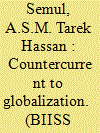

|
|
|
|
|
| Summary/Abstract |
The world has been witnessing a disrupting socio-political phenomenon of the emergence of right-wing populism. What is particularly striking about this is that it has concurrently affected politics and society both in Europe and the United States (US). There are several alarming consequences of the rise of right-wing populism, such as increasing rift between races and ethnicities, between and among social classes, and finally between cultures. It runs the risk of reversing the gains accrued from globalization and the ideas such as liberal democracy. Given the weight of this new socio-political phenomena, the article seeks to identify the causes behind the rise of populism. It argues that the roots of populism can be traced in the uneven development among states exacerbated by globalization process. The process has allowed for flight of capital from one country to another, and thereby, creating and perpetuating a new class of ultrarich. This has created inequality among states. The emergence of right-wing populism can be seen a knee-jerk reaction to the globalization.
|
|
|
|
|
|
|
|
|
|
|
|
|
|
|
|
| 3 |
ID:
185903


|
|
|
|
|
| Summary/Abstract |
This Special Issue provides diverse multidisciplinary entry points that convey the multi-layered complexity of the interactions between radical right populism, gender issues, and religious questions. It fills a gap in the scholarship dealing with the political and social manifestations of radical right populism. From a theoretical point of view, the connections between radical right populism and gender and between radical right populism and religion, respectively, have received growing scholarly attention. The present Special Issue bridges these separate lines of inquiry, concentrating on how issues of gender and religion are jointly addressed in radical right populist discourses. The articles in this Special Issue provide the first in-depth and comparative understanding of the entanglements of gender and religion in radical right populist ideology, explore the active role of religion in the populist discourse, and invite to combine the analysis of the political sphere with the analysis of occurrences in the broader society.
|
|
|
|
|
|
|
|
|
|
|
|
|
|
|
|
| 4 |
ID:
153550
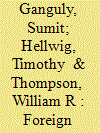

|
|
|
|
|
| Summary/Abstract |
Foreign policy belief systems have received much attention. Yet nearly all work examines attitudes in western democracies, chiefly the United States. The current security environment requires that we ask whether the foreign policy views of individuals in other nations—particularly regional powers—are similar in structure to those found in the US case. This article does so for the Indian case. Drawing on studies of US opinion, we develop a set of claims and test them on an original data set on Indian elites. We make four contributions. First, we show that Wittkopf’s framework applies to the Indian case. Second, we demonstrate how this framework can be made more generally applicable by revising its emphases on different types of internationalism and on rethinking the meaning of isolationist preferences. Third, we place the Indian case in comparative perspective. And last, we model the dimensions of Indian attitudes as a function of domestic ideology. Results of our analyses provide insights into the structure of foreign policy belief systems outside the Global North.
|
|
|
|
|
|
|
|
|
|
|
|
|
|
|
|
| 5 |
ID:
109968
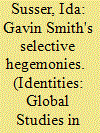

|
|
|
| 6 |
ID:
172516
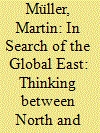

|
|
|
|
|
| Summary/Abstract |
Carving up the world into Global North and Global South has become an established way of thinking about global difference since the end of the Cold War. This binary, however, erases what this paper calls the Global East – those countries and societies that occupy an interstitial position between North and South. This paper problematises the geopolitics of knowledge that has resulted in the exclusion of the Global East, not just from the Global North and South, but from notions of globality in general. It argues that we need to adopt a strategic essentialism to recover the Global East for scholarship. To that end, it traces the global relations of IKEA’s bevelled drinking glass to demonstrate the urgency of rethinking the Global East at the heart of global connections, rather than separate from them. Thinking of such a Global East as a liminal space complicates the notions of North and South towards more inclusive but also more uncertain theorising.
|
|
|
|
|
|
|
|
|
|
|
|
|
|
|
|
| 7 |
ID:
133477
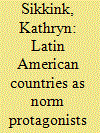

|
|
|
|
|
| Publication |
2014.
|
| Summary/Abstract |
Latin American governments, social movements, and regional organizations have made a far greater contribution to the idea and practice of international human rights than has previously been recognized. Most discussions of the global human rights regime stress its origins in the countries of the Global North. This article explores the role of Latin America states as early protagonists of the international protection of human rights, focusing in particular on the American Declaration of the Rights and Duties of Man. Histories of human rights in the world emphasize the Universal Declaration of Human Rights, passed by the UN General Assembly on 10 December 1948, as the founding moment of international human rights. Few know that Latin American states passed a similar American Declaration of the Rights and Duties of Man a full eight months before passage of the UDHR. The American Declaration thus was the first broad enumeration of rights adopted by an intergovernmental organization. This article explores the American Declaration as an example of often overlooked Latin American human rights protagonism that has continued to this day, and that calls into question the idea that human rights originated in only the Global North.
|
|
|
|
|
|
|
|
|
|
|
|
|
|
|
|
| 8 |
ID:
129934
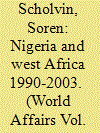

|
|
|
|
|
| Publication |
2014.
|
| Summary/Abstract |
Sören Scholvin sheds light on Nigeria as a regional power from 1990 to 2003, a time marked by the country's numerous security interventions in West Africa. The main finding is that while Nigeria demonstrated its regional dominance, realised some specific objectives and mostly kept external powers out of the area, it failed to gain broadbased support from neighbours as it often acted unilaterally.
|
|
|
|
|
|
|
|
|
|
|
|
|
|
|
|
| 9 |
ID:
192198


|
|
|
|
|
| Summary/Abstract |
The article attempts to empirically identify how the concept of Indigenous refusal helps us understand growing Palestinian political discourse and practices. It aims to develop Critical Indigenous Studies’ potentialities vis à vis the study of historic Palestine. The article puts a particular emphasis on new visions of Palestinian resistance that take aim at the different ways the Global North has tried to impose specific models and narratives on the Palestinian cause through liberal politics of recognition. Those spatio-political arrangements are enmeshed in the so-called ‘Oslo paradigm’ but also concern the portrayal of Israel as a liberal multicultural society, as well as the neoliberal dynamics that continuously shape the different fragments of the Palestinian people. In this regard, Indigenous Palestinian refusal also presents an international dimension that has progressively led to the articulation of anti-racist, anti-imperialist, and anti-capitalist imaginaries that would contribute to shaping radical Palestinian – and transnational – futures.
|
|
|
|
|
|
|
|
|
|
|
|
|
|
|
|
| 10 |
ID:
154706


|
|
|
|
|
| Summary/Abstract |
Each age has its own wars and its own forms of warfare. In today’s evolving world risk society warfare has entered a new development stage. The states of the “global North” adapt their forms of intervention. They increasingly practice postmodern warfare characterized especially by the role of influencing the information space, networked approaches, the incorporation of indirect and covert actions, and the special quality of new technologies. This practice furthers an increasing grey zone between limiting and de-bounding of warfare. The phenomenon of postmodern warfare raises some tough questions and offers a rich research agenda.
|
|
|
|
|
|
|
|
|
|
|
|
|
|
|
|
| 11 |
ID:
123370
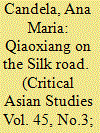

|
|
|
|
|
| Publication |
2013.
|
| Summary/Abstract |
The contemporary era of globalization poses challenges for reimagining Asian nations once associated with the Third World as spaces within the global capitalist world. The idea of the Global South incorporates these nations into a new post-cold war global imaginary, but does so in a way that recognizes the structural and social inequalities that continue to distinguish these nations from their more privileged counterparts in the Global North. The challenge of reimagining former Third World nations in the contemporary era of globalization is further complicated by the deepening of structural inequality within those nations. Growing class divides and uneven development in these nations have made it difficult to imagine Global South nations as homogenous entities. This article explores the complexities of imagining China in the era of globalization by examining a set of historical narratives: the Silk Road and qiaoxiang (sojourner villages), which emerged as strategies for situating China within new global imaginaries by re-narrating the histories of South China. Although the narratives mark a departure from nation-centered histories of the Mao era, they do not reflect a withering of the state or of nationalism in the face of globalization. Rather, they are connected to reconfigurations of the nation and state related to the challenges of managing the nation's current phase of capitalist development. By examining the ways in which these narratives are over-determined by shifting class formations, regional economic development strategies, place-based social and cultural legacies, global intellectual trends, and state interventions, which all shape South China's economic development, this article describes the function of these narratives as structures of feeling. As such, the Silk Road and qiaoxiang narratives give voice to the anxieties produced by China's opening to the capitalist world economy and attempt to reconcile the contradictions of China's current phase of economic development by rendering a complex social reality into historically recognizable forms.
|
|
|
|
|
|
|
|
|
|
|
|
|
|
|
|
| 12 |
ID:
121756
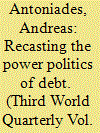

|
|
|
|
|
| Publication |
2013.
|
| Summary/Abstract |
The 2007-08 financial crisis exposed and exacerbated the debt pathologies of the West. This paper examines whether the new global debt relations that have been generated by this crisis have transformed global power politics, changing the way in which the global South and the global North interrelate and interact. To do so the paper analyses the G20 advanced and emerging economies, examining a number of key indicators related to debt, indebtedness and financial leverage. This research leads to two main findings. First, the crisis has indeed given rise to new global debt relations. As a result, any reforms in the post-crisis global political economy will take place in an environment that favours the rising powers. Second, the USA maintains its capacity to control the parameters of this new global debt politics and economics, but cannot directly impose the terms of a solution to the existing 'global/hegemonic imbalances' on the rising powers.
|
|
|
|
|
|
|
|
|
|
|
|
|
|
|
|
| 13 |
ID:
156648
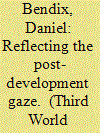

|
|
|
|
|
| Summary/Abstract |
Post-Development has reproduced the ‘development gaze’ by focusing on interventions and struggles in the South. This paper draws attention to the German version of degrowth, Postwachstum, as a possible Post-Development approach in the North. It thus contributes to the Post-Development agenda by including the North as a ‘development’ problem and by overcoming the view of the North as a homogeneous neo-liberal, capitalist, Eurocentric bloc. The paper examines key Postwachstum contributions with regard to their correspondence to insights of and gaps in the Post-Development debate. It argues that Postwachstum needs to include a postcolonial perspective on global inequalities and question the ‘development’–modernity–coloniality nexus more profoundly in order to provide a valuable contribution to the Post-Development agenda.
|
|
|
|
|
|
|
|
|
|
|
|
|
|
|
|
| 14 |
ID:
166959


|
|
|
|
|
| Summary/Abstract |
This Correspondence takes issue with the repeated use of the term “energy bullying” by authors Monyei, Jenkins, Serestina and Adewumi in their paper Energy Policy 119 (2018) pp68-76. Reasons are advanced why the authors' criticism of the global north lacks clear empirical evidence, and risks undermining efforts to combat climate change. A more constructive approach of working together between global south and global north is put forward by the corresponding authors.
|
|
|
|
|
|
|
|
|
|
|
|
|
|
|
|
|
|
|
|
|